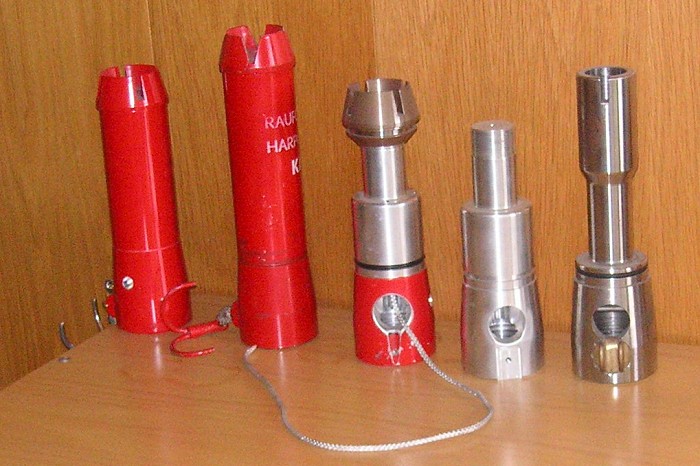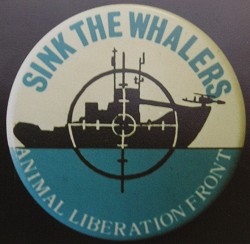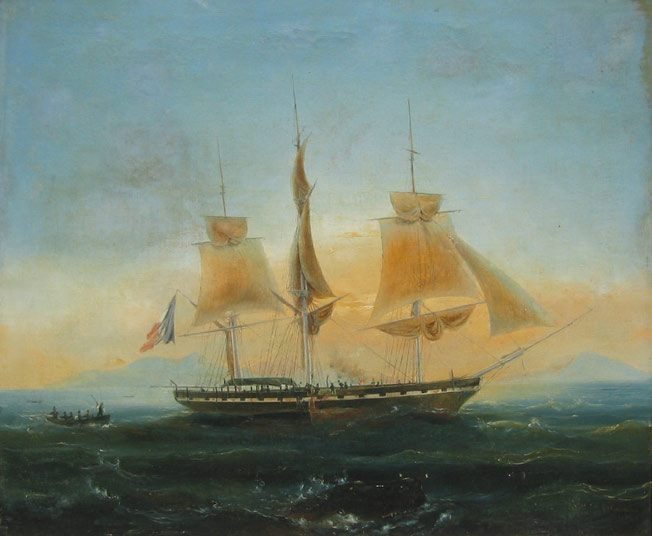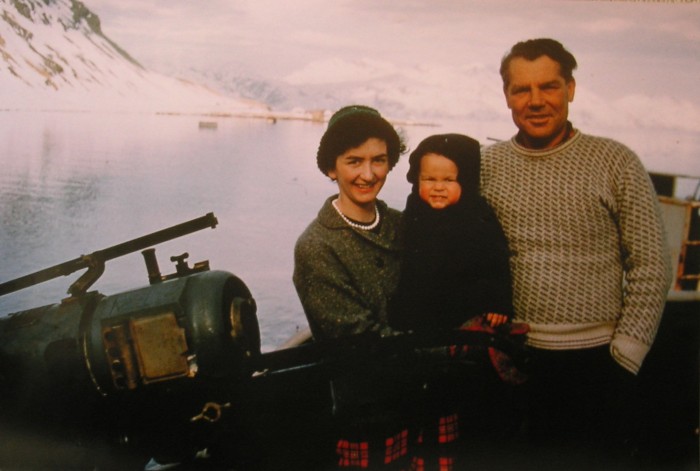
The Blue Box (Control Box) of the Automated Electronic Monitoring System developed for monitoring the minke whale hunting in Norway.
(from "Electronic Monitoring of Norwegian Minke Whaling" by Dr. Egil Ole Øen, on High North Alliance Web site)
(This is the text, slightly revised and updated, of a brochure that was distributed to the media at the 1994 annual meeting of the International Whaling Commission in Puerto Vallarta.)
By Klaus Barthelmess
1.1 Ecological Arguments
The whales are becoming extinct
Commercial whaling will always endanger the stocks/species
Whaling cannot be controlled
1. COMMONPLACE ARGUMENTS AGAINST
WHALING
One cannot talk about the whales. Rather one must distinguish between
more than 75 different species. Not a single whale species has become extinct
because of whaling. Furthermore, one must distinguish between different stocks
of whales. There may be threatened and non-threatened stocks of one and the
same species.
Plainly wrong! The California gray whale stock, for instance, has been hunted
by the Soviet Union since 1962 with an annual quota of almost 200 animals. In
the same period, this stock has almost doubled its numbers to over 20,000
animals, so that at the beginning of 1993 the US government removed this stock
from the list of endangered species.
Overfishing of whale stocks has invariably occurred where there was economic
competition for them.
In today's whaling operations this is no longer the case - almost for the
first time in about half a millennium of whaling history.
Yes it can! Norway, for instance, has agreed to and implemented an inspection
scheme, which has provided for inspectors on board every whaling vessel. Since
2005, the inspectors have been replaced by "black boxes" installed on board,
that register GPS position, engine effort, steering commands, harpoon cannon
shots, and the weight of each whale hauled on board in a manipulation-proof
way.

1.2 Ethical/Animal Welfare Arguments
Whales cannot be killed humanely
Whaling destroys social and family bonds within a whale pod
That's correct. But this also applies to mort kinds of animals that are hunted
or butchered, as well as to those whale pods whose members fall victim to
natural predators.

1.3 Economic Arguments
Whale products are superfluous or can be replaced by substitutes
That is correct, but again, this applies to products of , say, pigs or cattle
as well. To discontinue the use of their products, however, has to be the
consumer's own decision, not that of others. Apart from this, it must be noted
that the most important whale product today the meat for human
consumption, not pet food or frivolous things, as is often alleged.
Commercial whaling is a negligible factor in the economies of whaling
nations
This is true for the national economy as a whole. But for the regional economy
and communal structure, whaling has very great significance. (This explains the
"stubbornness" of the whaling nations in the face of the political pressure
exerted by the Western industrialized nations).
Whale watching is more profitable than whale catching
Whale watching is relatively "big" business only in coastal areas with an
excellent infrastructure in the hinterland, e.g. the US East and West coasts,
certain South African seaports, and limited areas in Australia and New Zealand.
Everywhere else, whale watching remains a risky small-scale business.
Present-day whaling, however, is universally conducted from relatively isolated
communities with an underdeveloped infrastructure in their hinterlands.
Therefore, whale watching may be a modest additional or alternative option for
one or two boat-owners within a remote whaling community, but not for all the
whale boat operators in the entire community. Furthermore, as the Norwegian
example of the one small whale catcher converted to whale watching has shown,
only about one third of the catcher's crew could retain their jobs with the
new tourist enterprise, the others had to be fired. Finally, not every taciturn
fisherman will rejoice at the prospect of taxiing ecstatically yahooing whale
tourists from the very metropolises, which are responsible for polluting the
seas that were his hunting ground.
Whale meat is heavily contaminated
This must not be generalized. All animal tissue from polluted environments is
contaminated to some degree. That applies to seafood as well. Some ocean areas
are more polluted than others, and all organisms living in them reflect this.
Furthermore, research has shown, that individuals even from one and the same
pod of cetaceans show enormous differences in contamination. It is true that
due to their feeding behavior, the blubber, organs and meat of "hunting"
toothed whales (Odontotcetes) are much more likely to be contaminated
than in the case of the "grazing" baleen whales (Mysticetes), which
skip over a few links in the food chain. From the nutritional point of view,
baleen whale meat, especially from little polluted seas, may in fact be one of
the healthiest foods one can eat today.
"Scientific" whaling is commercial whaling in disguise
Completely wrong! Research whaling programs entail immense costs, only a
fraction of which can be recovered by the sale of whale meat.
1.4 Legal Arguments
Whaling is illegal
Whoever makes such a claim proves nothing but ignorance of the legal regimes
that apply to whales. Whaling is managed and regulated on a number of levels,
both in the form of international conventions or agreements, such as the
International Convention for the Regulation of Whaling on which the
International Whaling Commission (IWC) is based, the Agreement which
established the North Atlantic Marine Mammal Commission (NAMMCO), or the
Agreement on the Conservation of Small Cetaceans in the Baltic and North Seas
(ASCOBANS), as well as legislation formulated on the national level, such as
the Marine Mammal Protection Act of the USA. Only a sovereign state can
"rule" what happens to the whales within its jurisdiction, i.e. if they are
either found in the territorial waters of that state, or if a vessel registered
in that state encounters them on the high seas. In an international treaty,
convention or agreement, however, the contracting parties are not "subjects to
be ruled", but equal partners who convene to cooperate for their mutual
benefit, while at the same time agreeing to forfeit certain sovereign rights of
their own. To ensure in the best democratic spirit their equal rights, an
international contract must contain a strong provision to protect dissident
minority positions among its contracting parties. The United Nations Convention
on the Law of the Sea (UNCLOS) requires states to cooperate on the management
of whales through the appropriate international organizations. This was also
reaffirmed by Agenda 21, which resulted from the Rio Conference on Environment
and Development (UNCED) in 1992.
No aspect of Japanese (research) whaling or Norwegian (commercial) whaling
today is "illegal", either on a national or international level.
1.5 Whale-Related Arguments
Whales are uniquely special ("humans of the sea")
Pseudo-scientific platitude! Whales are over-stylized by the media ("totemic
animals of the New Age"). Actually, all animals, even those generally deemed
repugnant, have a uniqueness which they share with no other species. This is
what makes zoological species "specific".
Whales are intelligent
Extremely debatable! Especially as there are no agreed definitions of
intelligence. And even if there were, this would not suffice to morally
proscribe whaling. Pigs are no doubt more "intelligent" than cattle, but this
does not lead people to make a distinction when it comes to killing them. (For
comparison, using the same criterion of intelligence as a moral qualifier upon
human society could mean, e.g., that the higher "IQ" of one accident victim
might result in a higher insurance payment than in the case of a "dumber"
victim).
Whales are gentle giants
Wrong! They are entirely "normal" giants, and, as with any other animal,
there are some rather disgustingly violent aspects about them as well, such as:

Whales have fascinating (a) communication (b) language
Whales can "sing" or even "compose
The well-known and popular "songs" come almost exclusively from male humpback
whales on their mating grounds. Thus, they may not be an expression of fun, but
of a stressful mating ritual. Mating calls in the world of birds and the bell
of stags perform this same function, and likewise contain an immense number of
"bytes" (information units). But to human ears they don't sound so appealing.
The fact that annual variations have been noted in whale "songs" is nothing
extraordinary in the animal kingdom, either.
Whales and dolphins are "friends of man
Wishful thinking! They are also "friends of driftwood", if you like. With
some species - notably toothed whales and gray whales - there is a more or less
pronounced instinct to play: they may toss marine turtles, flotsam, bunches of
seaweed around. A few individual gray whales - not at all! - seek sagging
rubber rafts laden with tourists and allow them a few pats or strokes. A few
species of dolphin and porpoise are also known to - sometimes and after a
certain time of habituation - permit swimmers and divers into their company.
Other animals, even carnivorous predators, sometimes do the same. Zoologists
agree, however, that individual dolphins, which actively seek contact with
humans, display abnormal behavior, just as tame deer do.
We still know so little about whales
Today whales are among the best studied wild animals. Scientific literature
about them is substantially more extensive than, for instance, about sparrows.
The fact that new questions arise with the emergence of new knowledge lies in
the very nature of science.
1.6 Cultural Arguments
Modern harpoon-gun whaling is unfair, since the whale has no chance
The more unfair a hunt is, the more efficient it is. From an ecological point
of view, an efficient hunting method is desirable, because fewer whales escape
wounded. In consequence, Alaska Inuit have begun using a small version of the
Norwegian-made penthrite grenade in addition to their traditional whaling tools
in order to reduce the struck-and-lost rate in their open-boat whaling
operations. Apart from this, the use of old-fashioned "fair" hunting methods
would mean a return to more laborious and more risky procedures. No working
person would tolerate such restrictions being imposed by outsiders.
Whaling is barbarous, uncivilized
Arrogant culturo-centrism! And a fairly modern point of view at that. In the
sixties, in some cases in the seventies, when modern commercial whaling was
still being conducted by today's foremost anti-whaling nations - USA, New
Zealand, United Kingdom, Germany (under foreign flag), the Netherlands and
others - the whaling men (and women) and their families enjoyed high social
prestige in their societies.

"World opinion" has proscribed whaling
Pure presumptuousness! This opinion is almost exclusively found in densely
populated urban Western societies, where people have become alienated from
nature and where care for pet animals compensates for weakened family ties and
social bonds. These societies - perhaps 20% of the world population - may be
the most outspoken and influential, but by no means do they represent "World
Opinion". Incidentally, these very societies have emerged from the Eurocentric
culture, which has a woeful history of colonialism and a lamentable habit of
deliberately ignoring the values found in foreign cultures. When it comes to
whaling, these societies still fail to acknowledge the democratic right of
dissident minorities.
Whales are killed for sport, in a blood frenzy or out of murderous
lust
Atrocious propaganda resulting from sheer ignorance of the living conditions in
remote fishing communities.
Other occupations and customs are history, too
True, but whaling can be continued at an ecologically responsible level. Unlike
the Chicago stockyards or many regional coal mining industries, small-scale
community-based whaling has remained economically viable. And it is not for
outsiders to forcibly change this.
Out of "historic guilt", people must make amends with whales
Subjective feeling of conscience; it cannot be imposed upon others.
Ethics evolve: humans have first overcome the scourge of racism, then of
sexism, and in the future will overcome that of speciesism
This is a hypothesis, not an established fact, and even as such it is extremely
disputable. Racism and sexism discriminate against fellow humans, speciesism
discriminates against non-humans. It is true that the introduction of human
rights was long opposed on the grounds of tradition, but they finally succeeded
as established values, because they are "intraspecific" rights,
i.e. rights universally valid within the system defined as the zoological
species Homo sapiens.
In contrast, "animal rights" would be "interspecific" rights,
i.e. rights valid across the boundaries of species diversity. Since every
carnivore or predator by nature infringes upon the "right" of its prey to
live, "animal rights" are not universally valid within the system defined as
the animal kingdom. "Animal rights" thus appear to be a philosophical
construction by humans for the explicit purpose of regulating human-animal and
not animal-human or animal-animal interactions.
Furthermore, the demand for "animal rights" itself discriminates against
other human beings on what can be called "topographical" grounds. The reason
is that humans who live in either high latitudes or high altitudes
nutritionally depend on a substantial share of animal protein in their diet. On
the basis of their habitat alone, these people are denied access to the ethical
standards propagated by the "animal rights" protagonists.

2. ARGUMENTS IN TOLERANCE OF WHALING
2.1 Economic Arguments
Today's whaling is ecologically responsible
No whale stock is any longer under hunting pressure from competing whaling
efforts. Therefore whalers now have a vested interest in keeping stocks at a
sustainable level. In the years of competitive whaling - which lasted for
almost five centuries - this was different, because a whaler who spared a whale
"for tomorrow" only worked into the pockets of rival whalers.
Whaling is no longer an over-capitalized business
Today's whaling is community-based. In Japan there are four, in Norway about
30 shrimp boat-sized vessels (average 20m or 60 ft.), which are usually owned
by families and crewed by four to nine people. This happens to be a
small-capital form of enterprise which many "green" economists recommend as
a safe-guard against the destructive over-exploitation of our planet's
natural resources.
In addition, together about half a dozen large-scale whale catchers can be
operated by Japan and Iceland. Since there is no more competitive whaling for a
world market, these vessels will never participate in any "whaling olympics".
Whaling is a livelihood in economically vulnerable regions
Perfectly right! In up to four communities in Japan and about six in Northern
Norway whaling is the economic mainstay. It is a decisive factor in keeping
people from migrating to the big cities as well as a safeguard against the
build-up of ecologically harmful industries in remote settlements.
2.2 Legal Arguments
Whales must not be taboo
If the zoological order of cetaceans (whales, dolphins and porpoises) is by
consensus declared exempt from man's moral right to harvest from natures
resources, this will constitute a legal precedent so that in the future it
could be argued likewise for other species of animals. Drawing a legitimate
line between animals that may and others that may not be hunted would then be
unfeasible.
2.3 Cultural Arguments
Whalers enjoy high social prestige
Whales represent the psychological archetype of the "Great Fish". That's why
their hunters and their families enjoy the highest prestige in their
communities, even if work in other branches of fisheries may be harder or more
dangerous, or other marine jobs may be better paid.
Since whalers live OFF nature they also live WITHIN nature
Small whaling communities are a good setting for acquiring and transmitting
knowledge about nature from generation to generation. This intimate knowledge
is derived not only from contact with the prey, but also with non-exploited
species, and it covers oceanographic and meteorological phenomena as well.
There is a whaling culture
This is confirmed by everyone who has ever lived with whalers. They are not
just a group of people with their own professional skills, but they also have
their own social organizations, their own jargon, their own folklore, their own
arts and crafts, in short, they have a distinctive cultural identity.

2.4 Questionability of the Counter
Arguments
Psychological compensation
It is noteworthy that the anti-whaling movement has its origin and mainstay
with just that part of this planet's population - viz. the people in the urban
centers of Western industrialized nations - whose lifestyle bears the largest
share of responsibility for destroying the natural environment worldwide. They
are just about 20% of the world population but consume approximately 80% of the
world's natural resources. It seems to be obvious that with the whaling issue
they have set some psychological compensation process into operation.
Ethics
Ethical standards are culturally defined. They must not be imposed upon other
cultures. If any such attempts are made through political or economic pressure,
this fulfils all the criteria for the concepts of "cultural chauvinism" or "
cultural imperialism".
Profits
Enormous sums are earned with the organized whaling counter-protest. The anti-
whaling organizations offer a kind of conscience service to city-dwellers who
have become alienated from nature: they "sell" them the illusion of being
mature and competent savers of nature. Annual income rates of hundreds of
millions of US dollars have led some critics to speak of a "protest industry".
It seems clear that, where such enormous sums are at stake, the scientific and
moral integrity of some anti-whaling information campaigns should not always be
taken at face value.
The Author
Klaus Barthelmess is a collector of whaling-related art, a professional whaling and sealing historian, museum, media and PR consultant. He earned his degrees from the University of his native Cologne, Germany. In the late 1970s and early 1980s he cooperated with several international and German anti-whaling organisations against the over-exploitation of some whale stocks evident at that time. In the course of field studies of Atlantic and Pacific whaling cultures, he has participated in whaling and whale-processing operations, and has conducted experiments in experimental whaling archaeology. He has authored and co-authored several books and numerous articles on whaling history, the history of cetology, whale-related fine arts, historical whale stranding records, sealing history and the whaling debate, and serves on the editorial boards of several specialized periodicals.
_